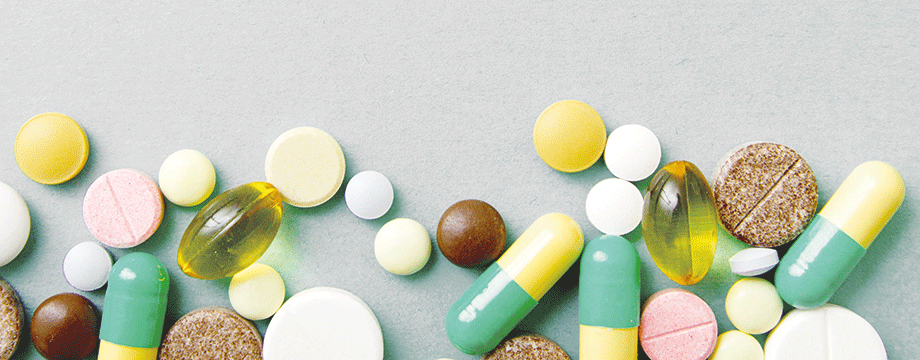Must-have vitamins for optimum health

If you eat a varied diet you shouldn’t need vitamins, right? In theory yes, but at certain stages in your life you might need a boost. We look at the role of the main vitamins and where to get them
Vitamins are essential for life – we simply can’t function without them,” says Susie Perry Debice, nutritional therapist at Abundance and Health who make Altrient C. “These tiny micro-nutrients act as co-factors for hundreds of enzymes present in different cells throughout our body. They are the switch that turns the light on – driving chemical reaction forward and helping to ignite growth, repair and maintain day-to-day activities that keep all our body systems working smoothly and efficiently. Vitamins even have an impact on brain chemistry influencing our mood and emotions.” You should pay special attention to certain vitamins in your diet.
Vitamin A
“Systems of the body that are influenced by vitamin A include the immune, respiratory and reproductive systems, and it is needed by the eye for good vision,” says Elaine Melican, nutritional therapist and manager at Open Sesame in Ennis, Co Clare. “As Vitamin A is a fat-soluble vitamin people on fat restricted diets or who have issues absorbing fats, such as coeliacs, or those with inflammatory bowel disease, pancreatic disorders or have had their gallbladder removed may become deficient in this vitamin.”
All the B’s
“The main areas of health that B-vitamins are important for include energy, metabolism, mood, memory, hormone balance and skin and hair health,” says Susie Perry Debice. “When it comes to food sources it’s all about the wholegrains.”
Vitamin C
“Vitamin C has numerous functions in the body from boosting immune cell activity to help us fight off infections, to increasing collagen production to boost the health of our skin, hair, nails, bones, teeth and gums,” says Susie Perry Debice. It acts as an antioxidant and protects cells from the harmful effects of free radicals generated by stress, inflammation and pollution. Altrient C is a liposomal form of vitamin C which has a higher absorption rate and better bioavailability compared to other forms of vitamin C.”
Vitamin D
“Many studies have linked vitamin D deficiency to most areas of the body,” says Elaine Melican. “This includes the immune system, skeletal system and mood disorders. Vitamin D deficiency has been associated with depression and seasonal affective disorder (SAD), blood sugar regulation and type 2 diabetes.”
Vitamin E
“As a potent antioxidant vitamin E reduces the risk of developing cardiovascular disease,” says Elaine Melican. “In female health it has been shown to reduce symptoms associated with PMS and menopause. It can be supportive in neurological disorders such as Alzheimer’s disease, and prevent degenerative eye conditions.”
Folate and vitamin B12
“Also known as folic acid, this water-soluble vitamin works with B12 to help form healthy red blood cells and protect the cardiovascular,” says Susie Perry Debice. “Folate is particularly important for pregnant women since it protects against birth defects. The body also uses B12 to make new proteins and healthy DNA and they also contribute to healthy metabolism and energy. Foods that are a good source of folates include beans, lentils, spinach, asparagus, lettuce, avocado, broccoli and whole wheat bread.”
Your A-Z of vitamins
Vitamin A - keeps eyes in good condition and boosts immune system. Found in cheese, eggs, oily fish, milk, fortified low-fat spreads and yogurt.
Vitamin B1 (thiamine) - essential for energy. Found in whole grains, seafood and beans.
Vitamin B2 (riboflavin) - keeps skin, hair and nails healthy and also for good eyesight. Found in some cheeses, almonds, oily fish, eggs, mushrooms and sesame seeds.
Vitamin B3 (niacin) - helps lower cholesterol and aids digestion. Found in beetroot, brewer’s yeast, salmon, tuna, sunflower seeds, fortified bread and cereals.
Vitamin B9 (folic acid, folate) – important for growth. Found in green vegetables and fortified foods like cereal and bread.
Vitamin B12 (cobalamin) – good for supporting blood cell and nerve growth. Found in liver, oily fish, dairy and eggs.
Vitamin C (ascorbic acid) – important antioxidant for protecting body from free radicals. Found in fresh fruit and vegetables.
Vitamin D (calciferol) - keeps bones, muscles and teeth healthy. Created by the body when exposed to sun and found in oily fish, eggs, fortified fat spreads and breakfast cereals, powdered milk.
Vitamin E (tocopherol) – important for energy and sex drive. Found in soya, corn and olive oil, nuts and seeds, wheat germ and cereals.
Vitamin K – important for blood clotting and building bones. Found in green leafy vegetables, such as broccoli and spinach, vegetable oils, cereals.
More Rude Health articles...
Articles from our latest issue...